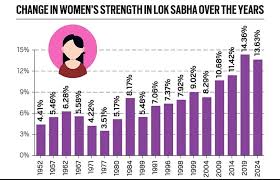The Need for More Women in Politics

- 15 Nov 2024
In News:
India, the world's largest democracy, is at a crucial juncture where women’s active political participation is essential for holistic development and true democratic engagement. The year 2024 demands increased involvement of women in politics to address issues of gender inequality and ensure comprehensive policy representation.
Current Status of Women’s Political Representation in India
Women in Parliament
- Initial Representation: In 1952, women accounted for only 4.41% of the Lok Sabha. This gradually rose to around 14.36% in the 2019 elections.
- Recent Trends: In the 2024 elections, women made up approximately 16% of the Lok Sabha, with 74 women MPs, 43 of whom are first-time representatives.
Women in State Legislatures
- Representation in state legislative assemblies remains low, with the highest percentages in Chhattisgarh (14.4%), West Bengal (13.7%), and Jharkhand (12.4%).
Global Comparison
- According to the Inter-Parliamentary Union (IPU), India ranks lower than many countries in terms of female representation in parliament, with global averages standing at 26.1%. India lags behind several African and South Asian nations.
Importance of Women’s Political Empowerment
- Enhancing Governance and Accountability: Political empowerment of women ensures better representation of gender-sensitive issues, promoting accountability in governance.
- Breaking Patriarchal Norms: Increasing women’s participation helps challenge the patriarchal structure that dominates Indian politics and promotes inclusive governance.
- Policy and Social Impact: Women in politics are more likely to advocate for policies that address issues like health, education, and gender equality, leading to improved societal welfare.
- Economic Benefits: Studies suggest that women in political leadership tend to improve economic outcomes for their constituencies by prioritizing social infrastructure.
Barriers to Women’s Political Participation
- Gender Gaps in Political Ambition: Women are less likely to pursue political careers due to gender conditioning, family pressures, and stereotypes about leadership abilities.
- Patriarchal Culture: A deeply ingrained patriarchal society hampers women’s political involvement, with male-dominated party structures and social norms limiting opportunities.
- High Election Costs: The financial burden of running for office often discourages women from contesting elections due to unequal access to resources.
- Male Gatekeepers in Politics: Political parties often show a preference for male candidates, especially for higher-profile positions, hindering the rise of women leaders.
- Criminalisation and Corruption in Politics: Growing criminalisation in politics and lack of political education further alienates women from the political process.
Key Legislative and Constitutional Measures for Women’s Political Empowerment
Legislative Measures
- Nari Shakti VandanAdhiniyam (2023): Provides 33% reservation for women in the Lok Sabha and state assemblies.
- 73rd and 74th Amendments (1992): Introduced 33% reservation for women in Panchayats and Municipalities.
- Gender-Neutral Rules: Lok Sabha adopted gender-neutral rules in 2014, promoting inclusivity in legislative procedures.
Constitutional Provisions
- Article 14 and 15: Ensure equality and non-discrimination, fundamental to women’s political participation.
- Article 243D: Mandates 33% reservation for women in Panchayats.
International Commitments
- CEDAW (1979): Advocates for women’s participation in political and public life.
- Beijing Platform (1995) and SDGs (2015): Call for removing barriers to women’s participation in politics.
Measures for Promoting Women’s Political Participation
- Quotas and Reservations: Ensuring mandatory quotas for women candidates in party tickets and legislative bodies can help bridge gender gaps.
- Capacity Building and Training: Offering political training programs for women can empower them with the skills and resources necessary for effective political participation.
- Strengthening Grassroots Movements: Support for Self-Help Groups (SHGs) and Panchayati Raj Institutions (PRIs) can build leadership among women at the local level.
- Supportive Political Ecosystem: Political parties should be encouraged to nominate women for higher office positions, such as the Rajya Sabha or state legislative councils.
- Raising Public Awareness: Public awareness campaigns focusing on the importance of women in politics can shift societal attitudes and garner wider public support.
Conclusion:
As India moves forward, the active participation of women in politics is not merely a matter of equity but an essential building block for a vibrant, inclusive, and effective democracy. Through structural reforms, public awareness, and the promotion of female leadership, India can strengthen its democratic framework, ensuring that all citizens, regardless of gender, have an equal stake in shaping the nation's future.
